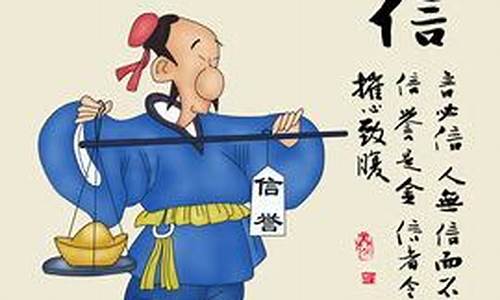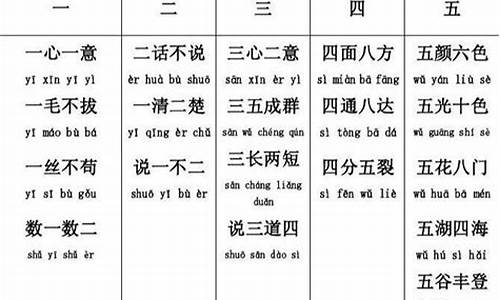您现在的位置是: 首页 > 成语谜语 成语谜语
十个诚信的成语典故简短英文翻译_十个诚信的成语典故简短英文翻译怎么写
ysladmin 2024-06-03 人已围观
简介十个诚信的成语典故简短英文翻译_十个诚信的成语典故简短英文翻译怎么写 作为十个诚信的成语典故简短英文翻译话题的专家,我对这个问题集合感到非常兴奋。我会按顺序逐一回答每个问题,并尽量提供全面而准确的信息,以便
作为十个诚信的成语典故简短英文翻译话题的专家,我对这个问题集合感到非常兴奋。我会按顺序逐一回答每个问题,并尽量提供全面而准确的信息,以便为大家带来更多的启发和思考。
1.10个诚信的成语典故简短
2.精选成语故事中英文大全
3.经典英语成语故事及翻译(五篇)
4.有关诚信的成语和故事
5.诚信成语典故都有哪些

10个诚信的成语典故简短
诚信的成语典故简短如下:关于诚信的成语故事有:曾子杀猪、立木为信、一诺千金、一饭千金、宋濂借书。
1、曾子杀猪。
故事梗概:曾子的妻子到集市去,她的儿子一边跟着她一边哭泣。他的母亲(曾子的妻子)说:你回去,等我回家后为你杀一头猪。妻子到集市后回来了,曾子就要抓住一头猪把它杀了,妻子制止他说:我只不过是与小孩子开玩笑罢了。
曾子说:小孩子是不能和他开玩笑的。小孩子是不懂事的,是要依赖父母学习的,并听从父母的教诲。现在你欺骗他,是在教他学会欺骗。母亲欺骗儿子,儿子就不会相信自己的母亲,这不是教育孩子该用的办法。于是,曾子马上杀猪煮了肉吃。
2、立木为信。
故事梗概:春秋战国时,秦国的商鞅在秦孝公的支持下主持变法。当时处于战争频繁、人心惶惶之际,为了树立威信,推进改革,商鞅下令在都城南门外立一根三丈长的木头,并当众许下诺言:谁能把这根木头搬到北门,赏金十两。
围观的人不相信如此轻而易举的事能得到如此高的赏赐,结果没人肯出手一试。于是,商鞅将赏金提高到50金。重赏之下必有勇夫,终于有人站起将木头扛到了北门。商鞅立即赏了他五十金。商鞅这一举动,在百姓心中树立起了威信,而商鞅接下来的变法就很快在秦国推广开了。
3、一诺千金。
故事梗概:秦末有个叫季布的人,一向说话算数,信誉非常高,许多人都同他建立起了浓厚的友情。后来,他得罪了汉高祖刘邦,被悬赏捉拿。结果他的旧日的朋友不仅不被重金所惑,而且冒着灭九族的危险来保护他,使他免遭祸殃。
一个人诚实有信,自然得道多助,能获得大家的尊重和友谊。反过来,如果贪图一时的安逸或小便宜,而失信于朋友,无异于失去了西瓜捡芝麻,得不偿失的。
精选成语故事中英文大全
四字诚信成语故事如下:一诺千金秦末有个叫季布的人,一向说话算数,信誉非常高,许多人都同他建立起了浓厚的友情。当时甚至流传着这样的谚语:“得黄金百斤,不如得季布一诺。”
立木为信春秋战国时,秦国的商鞅为了树立威信,推进改革,下令在都城南门外立一根三丈长的木头,并当众许下诺言:谁能把这根木头搬到北门,赏金十两。
围观的人不相信如此轻而易举的事能得到如此高的赏赐,结果没人肯出手一试。于是,商鞅将赏金提高到50金。重赏之下必有勇夫,终于有人站起将木头扛到了北门。商鞅立即赏了他五十金。商鞅这一举动,在百姓心中树立起了威信。
曾子杀彘有一次,曾参的妻子要到集市上办事,年幼的儿子吵着要去。曾参的妻子不愿带儿子去,便对他说回来就杀猪给他吃。
儿子听了,非常高兴,不再吵着要去集市了。这话本是哄儿子说着玩的,过后,曾参的妻子便忘了。不料,曾参却真的把家里的一头猪杀了。
尾生抱柱相传尾生与女子约定在桥梁相会,久候女子不到,水涨,乃抱桥柱而死。
君子之约/童叟无欺孔子东游的时候与一个叫项橐的小儿比试,各出一题,互为应对,胜者为师。孔子输后,果真拜项橐为师。这就是君子之约和童叟无欺的典故。
经典英语成语故事及翻译(五篇)
#能力训练# 导语成语是语言中的精华,是历史的产物,是人类智慧的结晶。下面是 考 网分享的精选成语故事中英文大全。欢迎阅读参考!
1.精选成语故事中英文
惊弓之鸟
In the Warring States Period, there was a man in the State of Wei called Geng Lei. One day he said to the king: 'I can shoot down birds by simply plucking my bowstring.' When the king expressed doubt, Geng Lei pointed his bow at a wild goose flying in the sky, twanged the bowstring, and the goose fell to the ground. Geng Lei said, 'This goose has been hurt in the past. Hearing the twang of the bowstring, it assumed that it was doomed. So it simply gave up trying to live.
战国时期(公元前403―221年中国中原地区各诸侯国连年争战的时代)魏国有个名叫更羸的人。一天,他对国王说:“我只要拉开弓,空射一下,就能把天上的鸟射下来。”国王不相信。更羸便对准天上飞来的一只雁射去,果真那只雁听到拉弦的声音就掉了下来。国王感到很奇怪。更羸说,“那是一只受过伤的雁。它一听到我拉开弓弦的声响,就惊慌得支持不住,自然要掉下来了。”
This idiom means that if one has been frightened in the past one's will may become paralysed in a similar situation.
“惊弓之鸟”这个成语比喻受过惊恐之后,有一点动静就特别害怕。
2.精选成语故事中英文
蛙臂挡车
One day, Zhuang Gong, King of the State of Qi, went out in a chariot to hunt.
一天,齐庄公乘车外出打猎。
On the way, he saw a small insect raise both its arms, trying to stop the wheels of the chariot. Zhuang Gong of Qi was curious and asked the driver:
路上,他看见一只小虫举起双臂,想阻挡车轮前进。齐庄公很好奇,就问车夫:
"What kind of insect is it?"
“这是什么虫子?”
"It is a mantis," the driver replied promptly. "This kind of insect only knows how to advance but not retreat, blindly underrating its enemies and overrating its own abilities."
车夫连忙回答:“这是蝗螂。这种虫子只知前进,不知后退,盲目轻敌,不自量力。”
Hearing the driver's reply, Zhuang Gong smiled to himself and remained silent.
听了车夫的回答,庄公暗自发笑,默默无语。
3.精选成语故事中英文
画蛇添足
Long long ago, several people had a jar of wine among them and all of them wanted to drink it by himself。 So they set a rule that every one would draw a snake on the 4 12 ground and the man who finished first would have the wine。 One man finished his snake very soon and he was about to drink the wine when he saw the others were still busy drawing, so he decided to draw the feet to the snake。 However, before he could finish the feet, another man finished and grabbed the jar from him, saying, "Who has ever seen a snake with feet?” The story of "Draw a snake and add feet to It。” tells us going too far is as bad as not going far enough。
古时几个人分一壶酒。他们都想独自喝完那壶酒,所以就定了一个规矩:每人在地上画一条蛇,谁画得最快,这壶酒就归谁。有一个人很快就把蛇画好了。他正打算喝这壶酒时,看见别人都还在忙着画,就决定给蛇再画上几只脚。结果,他的蛇脚还没加完,另一个人已经把蛇画好了。那人一下把酒壶夺了过去,说:“有谁见过长脚的蛇?”。这个故事告诉我们这样的道理:做得过分和做得不够都是不对的。
4.精选成语故事中英文
Making His Mark
刻舟求剑
A man from the state of Chu was taking a boat across a river when he dropped his sword into the water carelessly. Immediately he made a mark on the side of the boat where the sword dropped, hoping to find it later. When the boat stopped moving, he went into the water to search for his sword at the place where he had marked the boat. As we know, the boat had moved but the sword had not. Isnt this a very foolish way to look for a sword?
楚国有个人坐船渡江时,他不小心把自己的一把宝剑掉落江中。他马上掏出一把小刀,在宝剑落水的船舷上刻上一个记号。船靠岸后,那楚人立即从船上刻记号的地方跳下水去捞取掉落的宝剑。他怎么找得到宝剑呢?船继续行驶,而宝剑却不会再移动。像他这样去找剑,真是太愚蠢可笑了。
5.精选成语故事中英文
亡羊补牢
Once upon a time there lived a nomadic, raise dozens of sheep, grazing during the day, night into a with straw and wooden objects inside the shelter.
One morning, the herdsmen to the sheep, found little a sheep. Original pen broke a hole, night Wolf out of the hole drilled to come in, put a sheep diao away.
Neighbor advised him said: "the sheepfold quickly repaired, the hole plug. "
He said: "the sheep have been lost, but also to repair the sheep pen do? " Didnt accept his neighbors kind advice.
The next morning, he went to sheep and found a sheep was missing. Originally the Wolf from the inside of the hole into the sheepfold, and walked a sheep diao.
The herdsmen regret not to recognize directly by the neighbors advice, to take timely remedial measures. So he quickly plug that hole, again from the overall reinforcement, firmly and mend the sheepfold.
Since then, the sheep herders have never been Wolf diao has come.
Herdsmens story tells us: make a mistake, suffer setbacks, it is a common phenomenon. As long as can learn seriously, to take remedial measures in time, can avoid continue to make mistakes, suffer greater losses.
翻译:亡羊补牢
从前有一个牧民,养了几十只羊,白天放牧,晚上赶进一个用柴草和木桩等物围起来的羊圈内。
一天早晨,这个牧民去放羊,发现羊少了一只。原来羊圈破了个窟窿,夜间有狼从窟窿里钻了进来,把一只羊叼走了。
邻居劝告他说:“赶快把羊圈修一修,堵上那个窟窿吧。”他说:“羊已经丢了,还去修羊圈干什么呢?”没有接受邻居的好心劝告。
第二天早上,他去放羊,发现又少了一只羊。原来狼又从窟窿里钻进羊圈,又叼走了一只羊。
这位牧民很后悔没有认直接受邻居的劝告,去及时采取补救措施。于是,他赶紧堵上那个窟窿,又从整体进行加固,把羊圈修得牢牢实实的。
从此,这个牧民的羊就再也没有被野狼叼走过了。
牧民的故事告诉我们:犯了错误,遭到挫折,这是常见的现象。只要能认真吸取教训,及时采取补救措施,就可以避免继续犯错误,遭受更大的损失。
有关诚信的成语和故事
#能力训练# 导语成语在古代汉语与现代汉语的传承上占有重要的地位,它是汉语词汇系统中重要而又极富特色的组成部分。下面是 无 分享的经典英语成语故事及翻译经典英语成语故事及翻译(五篇)。欢迎阅读参考!
1.经典英语成语故事及翻译
卧薪尝胆
During the Spring and Autumn period (770-476BC), the State of Wu launched an attack against the State of Yue. The King of Wu was seriously wounded and soon died. His son Fu Chai became the new King. Fu was determined to get revenge. He drilled his army rigidly until it was a perfect fighting force. Three years later, he led his army against the State of Yue and caught its king Gou Jian. Fu took him to the State of Wu.
春秋时期,吴国和越国之间进行了一场战争,吴王不幸受了重伤,不久就死了。他的儿子夫差作了吴国的新国王,他发誓要替父亲报仇。于是,他严格的操练他的士兵,把他们训练成了一支非常厉害的军队。三年以后,他对越国发动了战争,抓住了越王勾践,把他带回了吴国。
In order to avenge his father's death, Fu let him live in a shabby stone house by his father's tomb and ordered him to raise horses for him. Gou pretended to be loyal to Fu but he never forgot his humiliation. Many years later, he was set free. Gou secretly accumulated a military force after he went back to his own state. In order to make himself tougher he slept on firewood and ate a gall-bladder before having dinner and going to bed every night. At the same time he administered his state carefully, developing agriculture and educating the people. After a few years, his country became strong. Then Gou seized a favorable opportunity to wipe out the State of Wu.
为了复仇,夫差让勾践住在他父亲墓旁的破石屋里天天看墓、喂马。勾践表面上服从,心里面却想着复仇。几年以后,勾践被放回越国。他立刻开始秘密聚集一支军队。为了提醒自己不要忘了报仇,他睡在柴上,还每天在吃饭睡觉前尝一尝苦胆。同时,他专心治理国家,大力发展农业,加强民众教育。几年后,越国又变得强大起来,然后,勾践抓住一个适当的机会消灭了吴国。
Later, people use it to describe one who endures self-imposed hardships to strengthen one's resolve to realize one's ambition.
后来,人们用它来形容人刻苦自励以达到自己定下的目标。
2.经典英语成语故事及翻译
望梅止渴
Quenching Thirst by Watching Plums
One summer, Cao Cao was leading his troops in a punitive expedition against Zhang Xiu. It was extraordinarily hot. The burning sun was like a fire, and the sky was cloudless. The soldiers were walking on the winding mountain paths. The dense forest and the hot rocks exposed to the sun on both sides of the paths made the soldiers feel suffocated. By noontime the soldiers' clothes were wet through with sweat, and the marching speed slowed down. Some solders of weak physique even fainted on the roadside.
Seeing that the marching speed was slower and slower, Cao Cao was very worried because he feared that he might bungle the chance of winning the battle. But how could they quicken their speed? Cao Cao at once callde the guide and asked him on the quiet whether there was a source of water nearby. The guide shook his head, saying that the spring water was on the other side of the mountain, which was very far to have to make a detour to reach. Cao Cao realized that time didn't permit them to make such a detour. After thinking for a moment, he said to the guide, "Keep quiet. I'll find a way out." He knew that it would be to no avail to order his troops to quicken the steps. He had a brain wave and found a good solution. He spurred his horse and came to the head of the column. Pointing his horsewhip to the front, Cao Cao said, "Soldiers, I know there is a big forest of plums ahead. The plums there are both big and delicious. let's hurry along, and we will reach the forest of plums after bypassing this hill." When the solders heard this, they immediately slobbered. Picturing in their minds the sweet and sour flavour of the plums, the soldiers felt as if they were actually eating the plums, the soldiers felt as if they were actually eating the plums themselves. The morale greatly boosted, the soldiers quickened their steps a great deal automatically.
This story comes from "The Fake Tangery" in Anecdotes of This World by Liu Yiqing of the Southern Dynasties period (420-589). From this story, people have derived the set phrase "quenching thirst by watching plums" to refer to trying to comfort oneself of others by idle dreams.
有一年夏天,曹操率领部队去讨伐张绣,天气热得出奇,骄阳似火,天上一丝云彩也没有,部队在弯弯曲曲的山道上行走,两边密密的树木和被阳光晒得滚烫的山石,让人透不过气来。到了中午时分,士兵的衣服都湿透了,行军的速度也慢下来,有几个体弱的士兵竟晕倒在路边。
曹操看行军的速度越来越慢,担心贻误战机,心里很是着急。可是,眼下几万人马连水都喝不上,又怎么能加快速度呢?他立刻叫来向导,悄悄问他:“这附近可有水源?”向导摇摇头说:“泉水在山谷的那一边,要绕道过去还有很远的路程。”曹操想了一下说,“不行,时间来不及。”他看了看前边的树林,沉思了一会儿,对向导说:“你什么也别说,我来想办法。”他知道此刻即使下命令要求部队加快速度也无济于事。脑筋一转,办法来了,他一夹马肚子,快速赶到队伍前面,用马鞭指着前方说:“士兵们,我知道前面有一大片梅林,那里的梅子又大又好吃,我们快点赶路,绕过这个山丘就到梅林了!”士兵们一听,仿佛已经吃到嘴里,精神大振,步伐不由得加快了许多。
故事出自《世说新语?假谲》。成语“望梅止渴”,比喻用空想安慰自己或他人。
3.经典英语成语故事及翻译
一鸣惊人
In the Warring States Period, Duke Wei of Qi neglected state affairs, for the first three years of his reign, giving himself over to dissipation. One of his ministers, Chun Yukun who had a good sense of humour, said to him: 'There is a big bird which has neither taken wing nor sung for three years.' The duke answered, 'Once that bird starts to fly and sing, it will astonish the world.' The duke thereupon devoted himself to his duties and built his state up into a powerful one.
战国时代,齐威王即位后做了三年国君,只顾享乐,不理政事。有个善于说笑话的人叫淳于髡,一天对齐威王说:“城里有一只大鸟,三年不飞也不叫,你知道这是什么道理?”齐威王说:“这鸟不飞则罢,一飞就冲天;不鸣则罢,一鸣就惊人。”在淳于髡的激发下,齐威王开始治理国家,取得很大成绩,齐国的声威一直保持了几十年。
4.经典英语成语故事及翻译
精卫填海
Once upon a time, the youngest daughter of Emperor Yan, legendary ruler of primitive China, went boating on the Eastern Sea. While she was enjoying herself, a strong wind rose on the sea and her boat capsized. Just before she was buried by the surging waves, her spirit turned into a beautiful bird. As it flew over the roaring sea, it cried sadly in the sound "jinwei, jingwei". That was why people called it "Jingwei".
The bird lived on a mountain near the sea. It hated the sea so much that it decided to fill it up. Every day, it flew to and fro between the mountain and the sea, carrying in a twig or a pebble from the mountain and dropping it into the sea.
One day, the roaring sea said to Jingwei, "Poor little bird, stop doing that meaningless thing! You'll never fill me up." Jingwei replied, "I'll fill you up no doubt! I will, even if it'll take me thousands of years! I'll fight on until doomsday!"
The brave little bird kept carrying twigs and pebbles from the mountain to the Eastern Sea without taking a rest.
From this fable comes the idiom "The bird Jingwei trying to fill the sea". We use it to describe people who are firm and indomitable and will not stop until they reach their goal.
从前,炎帝(传说中中国原始社会的统治者)的小女儿在东海上划船。正当她划得高兴时,海面上突然升起一阵大风,把她的小船弄翻了。就在她要被汹涌的波浪吞 没时,她的灵魂变成了一只美丽的小鸟。它飞过那咆哮的海面,伤心的叫着"精卫,精卫"的声音。所以人们就叫她"精卫"。
精卫鸟住在靠海的一座山上。它非常恨大海,所以决心要把它填平。它每天来回于山海之间,把从山上衔来的小树枝和小石子扔在大海里。
一天,咆哮的大海对精卫说:"可怜的小鸟,停止你那无谓的举动吧!你是永远都填不平我的。" 精卫回答说:"我当然会把你填平的!即使这需要千千万万年的时间,我也一定会斗争到底,直到你的末日来临!"
这只勇敢的小鸟继续从山上衔来小树枝和小石子,扔到东海中,从未有片刻休息。
"精卫填海"这个成语就是由这个传说而来的,形容那些坚定不移,不屈不挠,不到目的决不罢休的人。
5.经典英语成语故事及翻译
fail the exam
名落孙山
In the Song Dynasty (宋朝) there was a joker called Sun Shan(孙山).
宋朝有一个很幽默的人,他叫孙山。
One year he went to take the imperialexamination, and came bottomof the listof successfulcandidates.
有一年他去参加考试,公布名单时他是最后一名。
Back in his hometown, one of his neighbor asked him whetherthe neighbor's son had also passed.
回到家,他的邻居向他打听自己的儿子考得怎么样。
Sun Shan said, with a smile:"Sun Shan was the last on the list. Your son came after Sun Shan."
孙山笑着对邻居说:“孙山考了最后一名,你儿子的名字还在孙山的后面呢。”
The peopleused this idiom to indicatefailing in an examination or competition.
人们用“名落孙山”来比喻考试没有考上或者选拔没有被录取。
诚信成语典故都有哪些
三顾茅庐、妄自菲薄、作奸犯科、危急存亡、临危受命、计日可待、引喻失义、陟罚臧否、咨诹善道、裨补阙漏、斟酌损益、感激涕零、不知所云、感激涕零
一、三顾茅庐 [ sān gù máo lú ]
解释:顾:拜访;茅庐:草屋。原为汉末刘备访聘诸葛亮的故事。比喻真心诚意,一再邀请。
出自:三国蜀·诸葛亮《出师表》:“先帝不以臣卑鄙,猥自枉屈,三顾臣于草庐之中。”
翻译:先帝不嫌我卑微,降低自己的身份,三次到茅庐来拜访我。
二、作奸犯科[zuò jiān fàn kē]
解释:为非作歹,触犯法令;指干违法乱纪的事。
出自:三国蜀·诸葛亮《出师表》:“若有作奸犯科及为忠善者,宜付有司论其刑赏。”
翻译:如果有作奸犯科以及做好事的人,应当交给各主管部门决定对他们的惩罚和奖赏。
三、临危受命[lín wēi shòu mìng]
解释:意思是在危难之际接受任命。
出自:三国·蜀·诸葛亮《前出师表》:“ 受任于败军之际,奉命于危难之间。”
翻译:受任于败军之际,在危难之中奉行使命。
四、引喻失义[yǐn yù shī yì]
解释:指比喻不恰当。
出自:三国蜀·诸葛亮《前出师表》:“不宜妄自菲薄,引喻失义,以塞忠谏之路也。”
翻译:不应随便看轻自己,说一些不恰当的话,以致堵塞人们向您尽忠进谏的道路。
五、裨补阙漏[bì bǔ quē lòu]
解释:裨:增益。阙:通“缺”。缺点。阙漏:缺失、遗漏。补救缺点和疏漏。
出自:《三国志·蜀志·诸葛亮传》“必能裨补阙漏,有所广益。”
翻译:一定能弥补缺漏,得到更多的好处。
诚信成语典故100字都有哪些诚信成语典故:尾生抱柱
《庄子》上有一个故事:尾生与女子约,女子三日不至,遇大雨,尾生抱柱而死。每次想到这个故事,总让我回肠荡气,感慨不已。君子言必信,行必果,尾生该是一个君子了,一个人格魅力光芒四射的君子。为了那一个或许并不怎么重要的约定,为了践行自己的诺言,虽然用生命的绝唱来捍卫它。
尾生让我看到了承诺的可爱,那是一种出言不贰的承诺。
诚信成语典故:商鞅立信
商鞅是战国时期著名的变法家。为了树立威信,商鞅在变法前下令在秦国都城南门外立一根3丈长的木头,并当众许下诺言:谁把木头搬到北门,赏10金。人们不相信,无人搬动木头。商鞅把赏金涨到50金,一男子把木头扛到了北门,商鞅立即赏他50金。商鞅这一举动,使人们感到他是个说话算数的`人。于是商鞅的新法也获得了人们的信任,很快就在秦国推广了。
诚信成语典故:曾参杀猪
曾参,春秋末期鲁国有名的思想家、懦学家,是孔子门生中七十二贤之一。他博学多才,且十分注重修身养性,德行高尚。一次,他的妻子要到集市上办事,年幼的孩子吵着要去。曾参的妻子不愿带孩子去,便对他说:“你在家好好玩,等妈妈回来,将家里的猪杀了煮肉给你吃。”孩子听了,非常高兴,不再吵着要去集市了。这话本是哄孩子说着玩的,过后,曾参的妻子便忘了。不料,曾参却真的把家里的一头猪杀了。妻子看到曾参把猪杀了,就说,“我是为了让孩子安心地在家里等着,才说等赶集回来把猪杀了烧肉给他吃的,你怎么当真呢。”曾参说:“孩子是不能欺骗的。孩子年纪小,不懂世事,只得学习别人的样子,尤其是以父母作为生活的榜样。今天你欺骗了孩子,玷污了他的心灵,明天孩子就会欺骗你、欺骗别人;今天你在孩子面前言而无信,明天孩子就会不再信任你,你看这危害有多大呀。”
;今天的讨论已经涵盖了“十个诚信的成语典故简短英文翻译”的各个方面。我希望您能够从中获得所需的信息,并利用这些知识在将来的学习和生活中取得更好的成果。如果您有任何问题或需要进一步的讨论,请随时告诉我。









